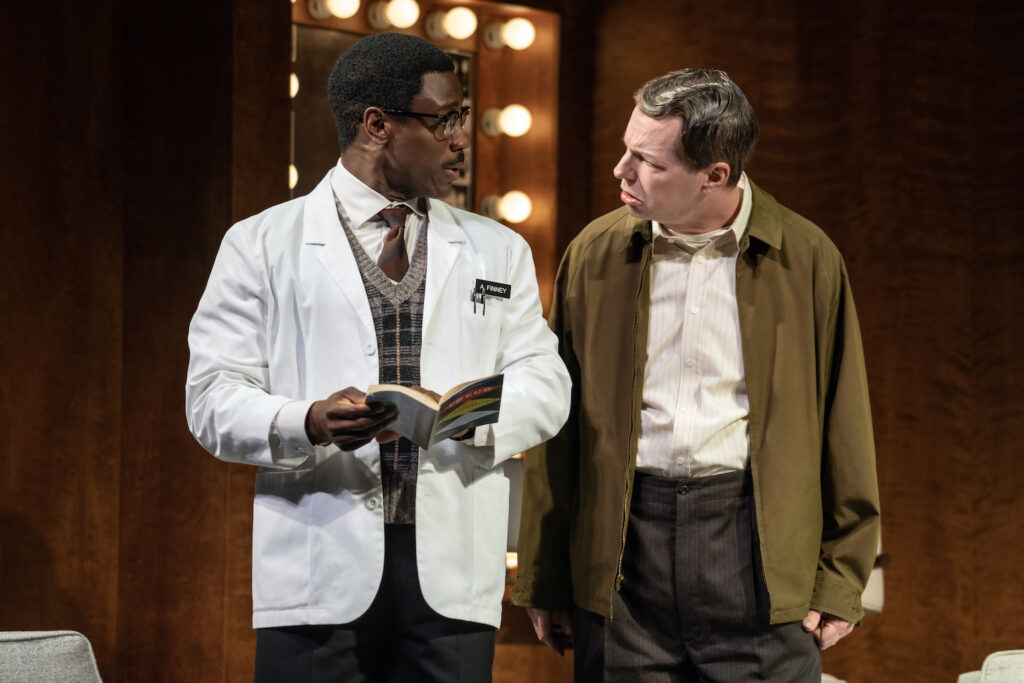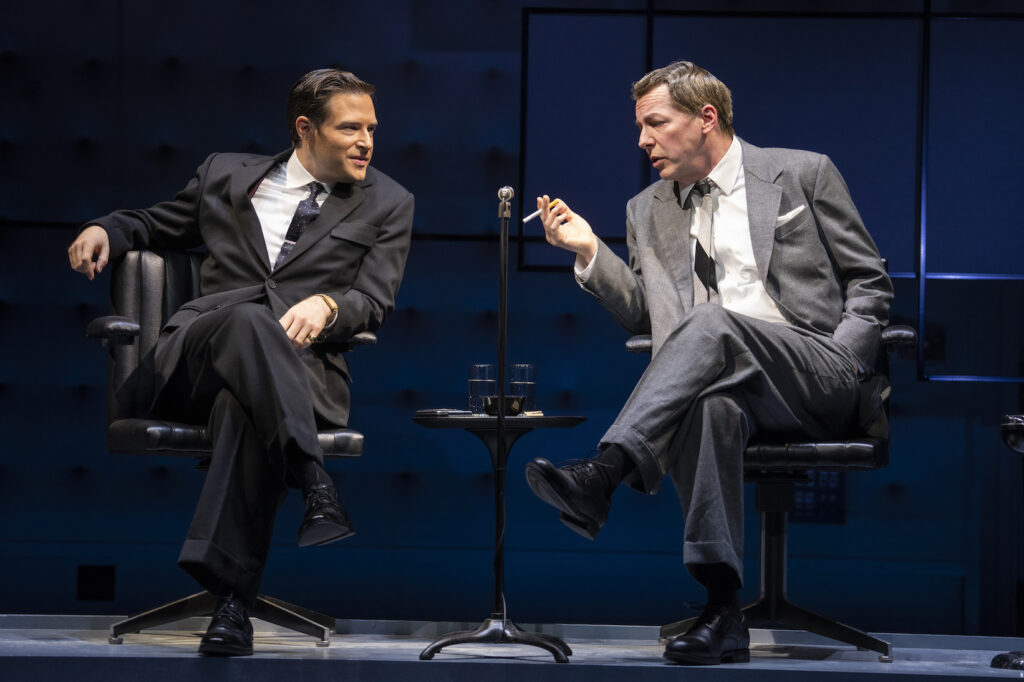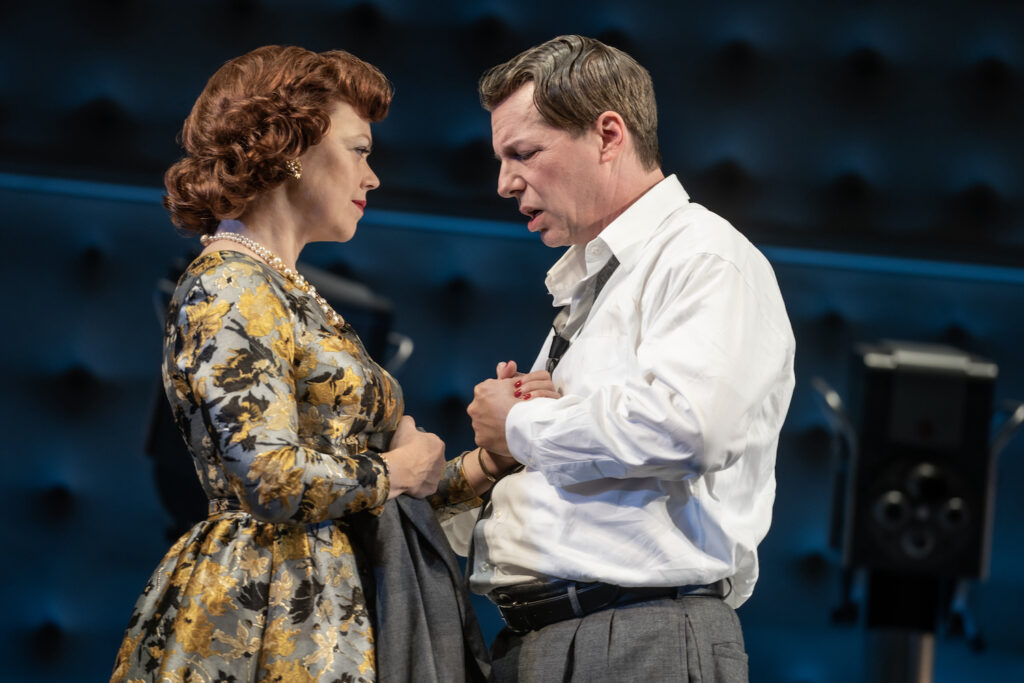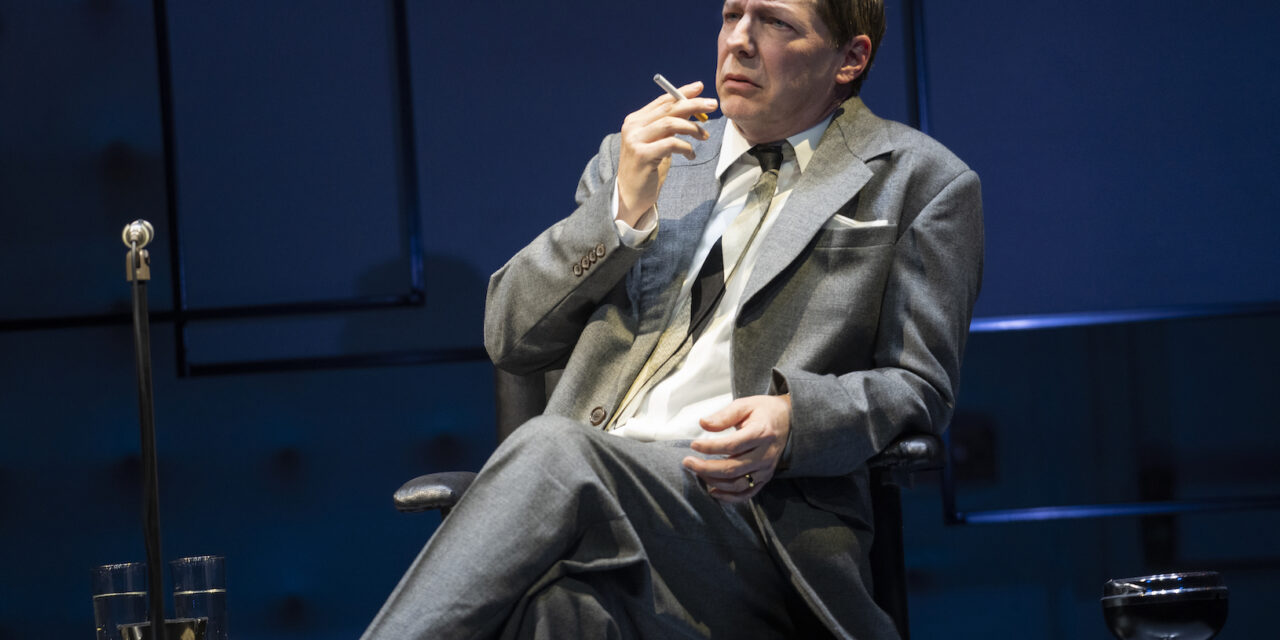By Samuel L. Leiter . . .
There are no theater awards for the best performance on a musical instrument by an actor, but if there were Sean Hayes (TV’s “Will and Grace”) would be a shoo-in. Toward the end of Good Night, Oscar, Tony-winning Doug Wright’s (I Am My Own Wife) bio-dramedy at the Belasco, Mr. Hayes, portraying the scathingly witty, prodigiously gifted, but psychologically impaired pianist/actor Oscar Levant, brings the house down with a virtuosic rendition of George Gershwin’s “Rhapsody in Blue.” His performance requires not only that he provide an explosive interpretation of the jazz classic, but that he do so while also experiencing a psychotic episode, somehow expressed in the interstices of his tour-de-force ivory tickling.
Instead, as the buzz would have it, Mr. Hayes—who already won a Jeff Award for the role at Chicago’s Goodman Theatre—will be a likely contender for a best actor (regardless of musicianship) award from one or more of the responsible institutions; if that happens, I’m afraid, my vote will go elsewhere. Not for a moment in this hour and 40-minute play did I believe that Mr. Hayes—who, even with makeup and costume, looks (and sounds) nothing like Oscar Levant—had come close to embodying this very particularized individual.

We observe numerous physical tics and mannerisms—including rotating head twitches, Parkinson-like hand shaking (reminiscent of what Tanya Pinkins distractingly introduced last year as Lena in A Raisin in the Sun), and phony chain-smoking (puffing instead of inhaling)—but rarely does any of it register as anything but an aggregation of hammy effects. Shouting half the time, angry almost always, Mr. Hayes chews the scenery as if it were his last meal. Only when he bites into “Rhapsody in Blue” was I able to share it.
Good Night, Oscar is a combination of fact and fancy whose premise is that, in the spring of 1958, pioneering late-night TV host Jack Paar (Ben Rappaport), following the dictate of NBC chief Bob Sarnoff (Peter Grosz)—seeking to boost the ratings—has temporarily moved the “Tonight” show from New York to NBC’s studios at Burbank, California. Paar’s main guest for his first West Coast show—to be followed by Jayne Mansfield and Senor Wences—is his high-strung friend, Oscar Levant; but Paar and Sarnoff are nervous because he’s late. This, we (but not Paar and Sarnoff) soon learn, is because his wife, June (Emily Bergl), has obtained a four-hour pass for Levant to leave the psychiatric hospital he’s in, accompanied by a Black medical orderly, Alvin Finney (Marchánt Davis), who carries with him a case filled with the various medications Levant requires.


Once in his dressing room, we hear an earful of exposition about just who Levant is through the device of having the show’s goofily nerdy young production assistant, Max Weinbaum (Alex Wyse), be a film buff who excitedly cross-examines the star about his career. Levant can’t stop fidgeting and asking for pills, just as he can’t stop being a quip machine, making practically every comment into a snappishly comical retort. He’s a walking encyclopedia of neuroses, which he converts to edgy humor, often at his own expense. As played, he comes off, however, as a boorish, obnoxious man without any of the unique charm that made him popular, seen here in brief clips from actual 1961 appearances with Paar.
Filled with self-loathing at his having made a name in movies (like An American in Paris) not as the lead but as a smart-assed sidekick to the lead, he also regrets that his musical composing talents have been sublimated to being an interpreter of others, especially George Gershwin (John Zdrojeski); the latter even converses with him in several hallucinations. (A chief source of “suspense” surrounds the questions of whether or not, during his on-air time, Levant will play the piano, and what, if he does, it will be.) These issues, combined with his family difficulties, which have led June to keep him from coming home, and his pill-popping addiction, contribute to the nervous breakdown we eventually witness.


Among the chief themes of Good Night, Oscar—a title based on Paar’s tagline, “Good night, Oscar Levant . . . wherever you are”—is the way live television kept controversial material from being aired. Levant was the kind of guest who could say something the network considered distasteful to large segments of its audience. Sarnoff insists he must, at all costs, avoid talking about politics, religion and sex. Sarnoff, in fact, has been doubtful that Levant should appear at all, only Paar’s intervention preventing him from booking Cuban bandleader Xavier Cugat instead.
When Levant’s segment is finally broadcast, however, it’s Paar himself who wades into troubled waters by introducing the forbidden subjects, opening the floodgates for his guest to spout controversial wisecracks, including an especially outrageous one concerning Arthur Miller, Marilyn Monroe, and kosher food that invites both shocked laughter and a storm of outraged calls that flood the phone lines. Yet, when Sarnoff explodes in rage, the playwright, confusingly, puts the blame mainly on Levant, not Paar, whose bait his guest was only too happy to swallow.


Wright plays a bit too freely with the historical facts to make his point. Among other things, the climactic Monroe joke, for example, was not given in 1958, but on a later TV show Levant himself hosted. Also, given the chronology, the show can’t reference an even better-known “scandal” initiated by Paar himself when he told an innocuous joke about a “WC” (water closet) that drew such a sharp rebuke he angrily walked off his own show.
Wright’s script too often creaks with two-dimensional contrivance, and Lisa Peterson’s direction—mingling farce with melodramatics—does little to add a third dimension. Rachel Hauck’s set, dramatically lit by Carolina Ortiz Herrera and Ben Stanton, takes us not only into the broadcast studio but into dressing rooms that easily deconstruct with sliding and flying units; for ultimate effect, she backs the concert scene with a huge wall of acoustical segments. Emilio Sosa’s costumes capture the late 1950s look well enough, while André Pluess’s exciting sound design makes an important contribution. Little of the acting surrounding Mr. Hayes, however, is of more than standard quality, some of it even less. Still, Mr. Rappaport’s Jack Parr, even if little like the man it represents, is the most consistently honest performance, if not quite as on the mark as Reid Scott’s in a very similar character on “The Marvelous Mrs. Maisel.”
Oscar Levant is certainly deserving of dramatization, as are his struggles with mental illness. As presented here, though, neither the man, nor his problems, provide a prescription for theatrical wellness.
Good Night, Oscar. Open run at the Belasco Theatre (111 West 44th Street, between Sixth and Seventh Avenues). www.goodnightoscar.com
Photos: Joan Marcus


















